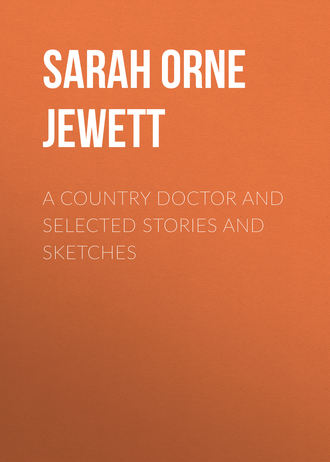 полная версия
полная версияA Country Doctor and Selected Stories and Sketches
"My daughter will be here next week," she observed, presently, "and I'm sure that she will do any shopping for you in Boston with great pleasure. We might forestall Marilla's plans. You could easily say when you go home that you have spoken to me about it. I think it would be an excellent opportunity now, while the East Road establishment is in disfavor," and when the doctor smiled and nodded, his friend and hostess settled herself comfortably in her chair, and felt that she had gained a point.
The sunshine itself could hardly have made that south parlor look pleasanter. There was a log in the fire that was wet, and singing gently to itself, as if the sound of the summer rustlings and chirpings had somehow been stored away in its sap, and above it were some pieces of drier white birch, which were sending up a yellow conflagration to keep the marauding snow-flakes from coming down the chimney. The geraniums looked brighter than by daylight, and seemed to hold their leaves toward the fireplace as if they were hands; and were even leaning out a little way themselves and lifting their blossoms like torches, as if they were a reserve force, a little garrison of weaker soldiers who were also enemies of the cold. The gray twilight was gathering out of doors; the trees looked naked and defenceless, as one saw them through the windows. Mrs. Graham tapped the arms of her chair gently with the tips of her fingers, and in a few minutes the doctor closed the book he was looking over and announced that the days were growing very short. There was something singularly pleasant to both the friends in their quiet Sunday afternoon companionship.
"You used to pay me a Sunday visit every week," said the old lady, pleased to find that her guest still lingered. "I don't know why, but I always have a hope that you will find time to run over for half an hour. I said to myself yesterday that a figure of me in wax would do just as well as anything nowadays. I get up and dress myself, and make the journey downstairs, and sit here at the window and have my dinner and go through the same round day after day. If it weren't for a certain amount of expense it incurs, and occupation to other people, I think it would be of very little use. However, there are some people still left who need me. Who is it says—Béranger perhaps—that to love benefits one's self, and to inspire love benefits others. I like to think that the children and grandchildren have the old place to think of and come back to. I can see that it is a great bond between them all, and that is very good. I begin to feel like a very old woman; it would be quite different, you know, if I were active and busy out of doors, and the bustling sort of person for which nature intended me. As it is, my mind is bustling enough for itself and its body both."
"Well," said the doctor, laughing a little, "what is it now?"
"The little girl," answered Mrs. Graham, gravely. "I think it is quite time she knew something of society. Don't tell yourself that I am notional and frivolous; I know you have put a great deal of hope and faith and affection into that child's career. It would disappoint you dreadfully if she were not interesting and harmonious to people in general. It seems a familiar fact now that she should have come to live with you, that she should be growing up in your house; but the first thing we know she will be a young lady instead of an amusing child, and I think that you cannot help seeing that a great deal of responsibility belongs to you. She must be equipped and provisioned for the voyage of life; she must have some resources."
"But I think she has more than most children."
"Yes, yes, I dare say. She is a bright little creature, but her brightness begins to need new things to work upon. She does very well at school now, I hear, and she minds very well and is much less lawless than she used to be; but she is like a candle that refuses to burn, and is satisfied with admiring its candlestick. She is quite the queen of the village children in one way, and in another she is quite apart from them. I believe they envy her and look upon her as being of another sort, and yet count her out of half their plans and pleasures, and she runs home, not knowing whether to be pleased or hurt, and pulls down half a dozen of your books and sits proudly at the window. Her poor foolish mother had some gifts, but she went adrift very soon, and I should teach Nan her duty to her neighbor, and make her take in the idea that she owes something to the world beside following out her own most satisfying plans. When I was a young woman it was a most blessed discovery to me—though I was not any quicker at making it than other people, perhaps,—that, beside being happy myself and valuable to myself, I must fit myself into my place in society. We are seldom left to work alone, you know. No, not even you. I know too much about you to believe that. And it isn't enough that we are willing to talk about ourselves. We must learn to understand the subjects of the day that everybody talks about, and to make sure of a right to stand upon the highest common ground wherever we are. Society is a sort of close corporation, and we must know its watchwords, and keep an interest in its interests and affairs. I call a gentleman the man who, either by birth or by nature, belongs to the best society. There may be bad gentlemen and good gentlemen, but one must feel instinctively at home with a certain class, representatives of which are likely to be found everywhere.
"And as for Nan, you will be disappointed if she does not understand a little later your own way of looking at things. She mustn't grow up full of whims and indifferences. I am too fond of you to look forward calmly to your being disappointed, and I do believe she will be a most lovely, daughterly, friendly girl, who will keep you from being lonely as you grow older, and be a great blessing in every way. Yet she has a strange history, and is in a strange position. I hope you will find a good school for her before very long."
This was said after a moment's pause, and with considerable hesitation, and Mrs. Graham was grateful for the gathering darkness which sheltered her, and not a little surprised at the doctor's answer.
"I have been thinking of that," he said quickly, "but it is a great puzzle at present and I am thankful to say, I think it is quite safe to wait a year or two yet. You and I live so much apart from society that we idealize it a good deal, though you are a stray-away bit of it. We too seldom see the ideal gentleman or lady; we have to be contented with keeping the ideal in our minds, it seems to me, and saying that this man is gentlemanly, and that woman ladylike. But I do believe in aiming at the best things, and turning this young creature's good instincts and uncommon powers into the proper channels instead of letting her become singular and self-centred because she does not know enough of people of her own sort."
Mrs. Graham gave a little sound of approval that did not stand for any word in particular: "I wonder if her father's people will ever make any claim to her? She said something about her aunt one day; I think it was to hear whatever I might answer. It seemed to me that the poor child had more pleasure in this unknown possession than was worth while; she appeared to think of her as a sort of fairy godmother who might descend in Oldfields at any moment."
"I did not know she thought of her at all," announced the doctor, somewhat dismayed. "She never has talked about her aunt to me. I dare say that she has been entertained with the whole miserable story."
"Oh, no," answered Mrs. Graham, placidly. "I don't think that is likely, but it is quite reasonable that the child should be aware of some part of it by this time. The Dyer neighbors are far from being reticent, good creatures, and they have little to remember that approaches the interest and excitement of that time. Do you know anything about Miss Prince nowadays? I have not heard anything of her in a long while."
"She still sends the yearly remittance, which I acknowledge and put into the savings bank as I always have done. When Nan came to me I advised Miss Prince that I wished to assume all care of her and should be glad if she would give me entire right to the child, but she took no notice of the request. It really makes no practical difference. Only," and the doctor became much embarrassed, "I must confess that I have a notion of letting her study medicine by and by if she shows a fitness for it."
"Dear, dear!" said the hostess, leaning forward so suddenly that she knocked two or three books from the corner of the table, and feeling very much excited. "John Leslie, I can't believe it! but my dear man used to say you thought twice for everybody else's once. What can have decided you upon such a plan?"
"How happened the judge to say that?" asked the doctor, trying to scoff, but not a little pleased. "I'm sure I can't tell you, Mrs. Graham, only the idea has grown of itself in my mind, as all right ideas do, and everything that I can see seems to favor it. You may think that it is too early to decide, but I see plainly that Nan is not the sort of girl who will be likely to marry. When a man or woman has that sort of self-dependence and unnatural self-reliance, it shows itself very early. I believe that it is a mistake for such a woman to marry. Nan's feeling toward her boy-playmates is exactly the same as toward the girls she knows. You have only to look at the rest of the children together to see the difference; and if I make sure by and by, the law of her nature is that she must live alone and work alone, I shall help her to keep it instead of break it, by providing something else than the business of housekeeping and what is called a woman's natural work, for her activity and capacity to spend itself upon."
"But don't you think that a married life is happiest?" urged the listener, a good deal shocked at such treason, yet somewhat persuaded by its truth.
"Yes," said Dr. Leslie, sadly. "Yes indeed, for most of us. We could say almost everything for that side, you and I; but a rule is sometimes very cruel for its exceptions; and there is a life now and then which is persuaded to put itself in irons by the force of custom and circumstances, and from the lack of bringing reason to bear upon the solving of the most important question of its existence. Of course I don't feel sure yet that I am right about Nan, but looking at her sad inheritance from her mother, and her good inheritances from other quarters, I cannot help feeling that she might be far more unhappy than to be made ready to take up my work here in Oldfields when I have to lay it down. She will need a good anchor now and then. Only this summer she had a bad day of it that made me feel at my wits' end. She was angry with one of the children at school, and afterward with Marilla because she scolded her for not keeping better account of the family times and seasons, and ran away in the afternoon, if you please, and was not heard from until next morning at breakfast time. She went to the old place and wandered about the fields as she used, and crept into some shelter or other. I dare say that she climbed in at one of the windows of the house, though I could not make quite sure without asking more questions than I thought worth while. She came stealing in early in the morning, looking a little pale and wild, but she hasn't played such a prank since. I had a call to the next town and Marilla had evidently been awake all night. I got home early in the morning myself, and was told that it was supposed I had picked up Nan on the road and carried her with me, so the blame was all ready for my shoulders unless we had both happened to see the young culprit strolling in at the gate. I was glad she had punished herself, so that there was no need of my doing it, though I had a talk with her a day or two afterward, when we were both in our right minds. She is a good child enough."
"I dare say," remarked Mrs. Graham drily, "but it seems to me that neither of you took Marilla sufficiently into account. That must have been the evening that the poor soul went to nearly every house in town to ask if there were any stray company to tea. Some of us could not help wondering where the young person was finally discovered. She has a great fancy for the society of Miss Betsy Milman and Sally Turner at present, and I quite sympathize with her. I often look over there and see the end of their house with that one little square window in the very peak of it spying up the street, and wish I could pay them a visit myself and hear a bit of their wise gossip. I quite envy Nan her chance of going in and being half forgotten as she sits in one of their short chairs listening and watching. They used to be great friends of her grandmother's. Oh no; if I could go to see them they would insist upon my going into the best room, and we should all be quite uncomfortable. It is much better to sit here and think about them and hear their flat-irons creak away over the little boys' jackets and trousers."
"I must confess that I have my own clothes mended there to this day," said the doctor. "Marilla says their mending is not what it used to be, too, but it is quite good enough. As for that little window, I hardly ever see it without remembering the day of your aunt Margaret's funeral. I was only a boy and not deeply afflicted, but of course I had my place in the procession and was counted among the mourners, and as we passed the Milman place I saw the old lady's face up there just filling the four small panes. You know she was almost helpless, and how she had got up into the little garret I cannot imagine, but she was evidently determined to inspect the procession as it went down the burying-ground lane. It was a pity they did not cut the window beneath it in the lower room in her day. You know what an odd face she had; I suppose it was distorted by disease and out of all shape it ever knew; but I can see it now, framed in with its cap border and the window as if there were no more of her."
"She really was the most curious old creature; it more than accounts for Mrs. Turner's and Miss Betsy's love for a piece of news," said Mrs. Graham, who was much amused. "But I wish we understood the value of these old news-loving people. So much local history and tradition must die with every one of them if we take no pains to save it. I hope you are wise about getting hold of as much as possible. You doctors ought to be our historians, for you alone see the old country folks familiarly and can talk with them without restraint."
"But we haven't time to do any writing," the guest replied. "That is why our books amount to so little for the most part. The active men, who are really to be depended upon as practitioners, are kept so busy that they are too tired to use the separate gift for writing, even if they possess it, which many do not. And the literary doctors, the medical scholars, are a different class, who have not had the experience which alone can make their advice reliable. I mean of course in practical matters, not anatomy and physiology. But we have to work our way and depend upon ourselves, we country doctors, to whom a consultation is more or less a downfall of pride. Whenever I hear that an old doctor is dead I sigh to think what treasures of wisdom are lost instead of being added to the general fund. That was one advantage of putting the young men with the elder practitioners; many valuable suggestions were handed down in that way."
"I am very well contented with my doctor," said Mrs. Graham, with enthusiasm, at this first convenient opportunity. "And it is very wise of you all to keep up our confidence in the face of such facts as these. You can hardly have the heart to scold any more about the malpractice of patients when we believe in you so humbly and so ignorantly. You are always safe though, for our consciences are usually smarting under the remembrance of some transgression which might have hindered you if it did not. Poor humanity," she added in a tone of compassion. "It has to grope its way through a deal of darkness."
The doctor sighed, but he was uncommonly restful and comfortable in the large arm-chair before the fender. It was quite dark out of doors now, and the fire gave all the light that was in the room. Presently he roused himself a little to say "'Poor humanity,' indeed! And I suppose nobody sees the failures and miseries as members of my profession do. There will be more and more sorrow and defeat as the population increases and competition with it. It seems to me that to excel in one's work becomes more and more a secondary motive; to do a great deal and be well paid for it ranks first. One feels the injury of such purposes even in Oldfields."
"I cannot see that the world changes much. I often wish that I could, though surely not in this way," said the lame woman from her seat by the window, as the doctor rose to go away. "I find my days piteously alike, and you do not know what a pleasure this talk has been. It satisfies my hungry mind and gives me a great deal to think of; you would not believe what an appetite I had. Oh, don't think I need any excuses, it is a great pleasure to see you drive in and out of the gate, and I like to see your lamp coming into the study, and to know that you are there and fond of me. But winter looked very long and life very short before you came in this afternoon. I suppose you have had enough of society for one day, so I shall not tell you what I mean to have for tea, but next Sunday night I shall expect you to come and bring your ward. Will you please ring, so that Martha will bring the lights? I should like to send Nan a nice letter to read which came yesterday from my little grand-daughter in Rome. I shall be so glad when they are all at home again. She is about Nan's age, you know; I must see to it that they make friends with each other. Don't put me on a dusty top shelf again and forget me for five or six weeks," laughed the hostess, as her guest protested and lingered a minute still before he opened the door.
"You won't say anything of my confidences?" at which Mrs. Graham shakes her head with satisfactory gravity, though if Doctor Leslie had known she was inwardly much amused, and assured herself directly that she hoped to hear no more of such plans; how could he tell that the girl herself would agree to them, and whether Oldfields itself would favor Nan as his own successor and its medical adviser? But John Leslie was a wise, far-seeing man, with a great power of holding to his projects. He really must be kept to his promise of a weekly visit; she was of some use in the world after all, so long as these unprotected neighbors were in it, and at any rate she had gained her point about the poor child's clothes.
As for the doctor, he found the outer world much obscured by the storm, and hoped that nobody would need his services that night, as he went stumbling home though the damp and clogging snow underfoot. He felt a strange pleasure in the sight of a small, round head at the front study window between the glass and the curtain, and Nan came to open the door for him, while Marilla, whose unwonted Sunday afternoon leisure seemed to have been devoted to fragrant experiments in cookery, called in pleased tones from the dining-room that she had begun to be afraid he was going to stay out to supper. It was somehow much more homelike than it used to be, the doctor told himself, as he pushed his feet into the slippers which had been waiting before the fire until they were in danger of being scorched. And before Marilla had announced with considerable ceremony that tea was upon the table, he had assured himself that it had been a very pleasant hour or two at Mrs. Graham's, and it was the best thing in the world for both of them to see something of each other. For the little girl's sake he must try to keep out of ruts, and must get hold of somebody outside his own little world.
But while he called himself an old fogy and other impolite names he was conscious of a grave and sweet desire to make the child's life a successful one,—to bring out what was in her own mind and capacity, and so to wisely educate her, to give her a place to work in, and wisdom to work with, so far as he could; for he knew better than most men that it is the people who can do nothing who find nothing to do, and the secret of happiness in this world is not only to be useful, but to be forever elevating one's uses. Some one must be intelligent for a child until it is ready to be intelligent for itself, and he told himself with new decision that he must be wise in his laws for Nan and make her keep them, else she never would be under the grace of any of her own.
XI
NEW OUTLOOKS
Dr. Leslie held too securely the affection of his townspeople to be in danger of losing their regard or respect, yet he would have been half pained and half amused if he had known how foolishly his plans, which came in time to be his ward's also, were smiled and frowned upon in the Oldfields houses. Conformity is the inspiration of much second-rate virtue. If we keep near a certain humble level of morality and achievement, our neighbors are willing to let us slip through life unchallenged. Those who anticipate the opinions and decisions of society must expect to be found guilty of many sins.
There was not one of the young village people so well known as the doctor's little girl, who drove with him day by day, and with whom he kept such delightful and trustful companionship. If she had been asked in later years what had decided her to study not only her profession, but any profession, it would have been hard for her to answer anything beside the truth that the belief in it had grown with herself. There had been many reasons why it seemed unnecessary. There was every prospect that she would be rich enough to place her beyond the necessity of self-support. She could have found occupation in simply keeping the doctor's house and being a cordial hostess in that home and a welcome guest in other people's. She was already welcome everywhere in Oldfields, but in spite of this, which would have seemed to fill the hearts and lives of other girls, it seemed to her like a fragment of her life and duty; and when she had ordered her housekeeping and her social duties, there was a restless readiness for a more absorbing duty and industry; and, as the years went by, all her desire tended in one direction. The one thing she cared most to learn increased its attraction continually, and though one might think the purpose of her guardian had had its influence and moulded her character by its persistence, the truth was that the wise doctor simply followed as best he could the leadings of the young nature itself, and so the girl grew naturally year by year, reaching out half unconsciously for what belonged to her life and growth; being taught one thing more than all, that her duty must be followed eagerly and reverently in spite of the adverse reasons which tempted and sometimes baffled her. As she grew older she was to understand more clearly that indecision is but another name for cowardice and weakness; a habit of mind that quickly increases its power of hindrance. She had the faults that belonged to her character, but these were the faults of haste and rashness rather than the more hopeless ones of obstinacy or a lack of will and purpose.
The Sunday evening tea-drinking with Mrs. Graham, though somewhat formidable at first to our heroine, became quickly one of her dearest pleasures, and led to a fast friendship between the kind hostess and her young guest. Soon Nan gave herself eagerly to a plan of spending two or three evenings a week across the way for the purpose of reading aloud, sometimes from books she did not understand, but oftener from books of her own choice. It was supposed to be wholly a kindness on the young girl's part, and Mrs. Graham allowed the excuse of a temporary ailment of her own strong and useful eyes to serve until neither she nor Nan had the least thought of giving up their pleasant habit of reading together. And to this willing listener Nan came in time with her youthful dreams and visions of future prosperities in life, so that presently Mrs. Graham knew many things which would have surprised the doctor, who on the other hand was the keeper of equally amazing and treasured confidences of another sort. It was a great pleasure to both these friends, but most especially to the elderly woman, that Nan seemed so entirely satisfied with their friendship. The busy doctor, who often had more than enough to think and worry about, sometimes could spare but little time to Nan for days together, but her other companion was always waiting for her, and the smile was always ready by way of greeting when the child looked eagerly up at the parlor window. What stories of past days and memories of youth and of long-dead friends belonging to the dear lady's own girlhood were poured into Nan's delighted ears! She came in time to know Mrs. Graham's own immediate ancestors, and the various members of her family with their fates and fortunes, as if she were a contemporary, and was like another grandchild who was a neighbor and beloved crony, which real blessing none of the true grandchildren had ever been lucky enough to possess. She formed a welcome link with the outer world, did little Nan, and from being a cheerful errand-runner, came at last to paying friendly visits in the neighborhood to carry Mrs. Graham's messages and assurances. And from all these daily suggestions of courtesy and of good taste and high breeding, and helpful fellowship with good books, and the characters in their stories which were often more real and dear and treasured in her thoughts than her actual fellow townsfolk, Nan drew much pleasure and not a little wisdom; at any rate a direction for which she would all her life be thankful. It would have been surprising if her presence in the doctor's house had not after some time made changes in it, but there was no great difference outwardly except that she gathered some trifling possessions which sometimes harmonized, and as often did not, with the household gods of the doctor and Marilla. There was a shy sort of intercourse between Nan and Mrs. Graham's grandchildren, but it was not very valuable to any of the young people at first, the country child being too old and full of experience to fellowship with the youngest, and too unversed in the familiar machinery of their social life to feel much kinship with the eldest.






